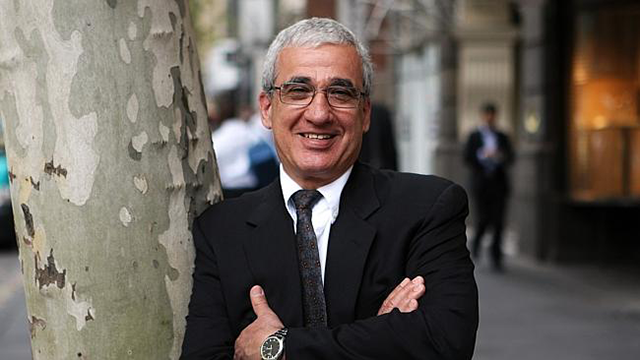
Jacob Karni, a pioneer of numerous solar energy technology projects, says the industry has to stand on its own two feet. Picture: Aaron Francis Source: News Corp Australia
HE is known as Israel’s solar star.
Over more than two decades of work at the world-renowned Weizmann Institute of Science in Tel Aviv, Jacob Karni and his team have been pioneers of numerous solar energy technology projects.
Now Professor Karni wants to take his technology to the gas fields of South Australia and Queensland to help the operations of the nation’s biggest gas companies become more efficient and environmentally friendly.
NewCO2Fuels, a three-year-old Israeli producer of systems that convert carbon dioxide emissions into synthetic gas and backed by the Weizmann Institute, is in the process of building a commercial-scale plant to further test its revolutionary technology.
NewCO2Fuels uses extreme heat to convert carbon dioxide and water into synthetic gas than can be processed into fuel or chemicals, or used to generate electricity.
While the company is conducting initial trials with steel manufacturers, who are using the technology to turn otherwise wasted heat into power, Professor Karni now sees opportunities in Australia with large energy retailers, large gas companies and, in the future, those building the giant LNG plants in Queensland.
“Here is the bottom line. Everyone wants the environment to be cleaner. Everyone wants less CO2, less pollutants in the air. The only argument is how much we are willing to pay for it.
“With this technology, for the first time you have the ability to reduce the amount of CO2 and provide benefits, not costs,’’ Professor Karni told The Australian during a recent visit to Australia.
“That is the breakthrough of this technology. It is not in a niche market. It is on a global scale with various industries. The potential is enormous. When you want to do it, you don’t have to convince politicians to subsidise it. You simply show that it is good business sense.’’
The company recently signed a memorandum of understanding with one of the world’s largest steel manufacturers to explore the opportunity to use excess heat from the steel industry to produce fuel and set up a pilot at one of the manufacturer’s key sites in Europe.
In June, NewCO2Fuels received a $3 million commitment from one of its original investors, ASX-listed Greenearth Energy, and would require about $5 million more to complete the trial plant, according to chief executive David Banitt.
Green earth Energy is an Australia-based renewable energy company with interests in technology-focused solutions and now has 33 per cent of the equity of NewCO2Fuels in Israel.
Investors in the stock have had to be patient.
The shares rose over the 20c mark in late 2009 following their 2008 listing but then went on a steady decline until mid-2013, when they fell below the 4c mark. The shares then rose above 10c but are now trading below 6c.
Mr Banitt claimed the so-called “NCF’’ technology had recently been evaluated by a US multinational company that builds gasification plants and found that the $63 million addition of the product to a $1 billion plant increased the efficiency of the plant by 20 per cent.
NewCO2Fuels also has established a collaboration agreement with Europe-based global conglomerate to partner on product development.
“By proving this through waste heat and solar and both being financially viable, it is now at a stage where, from a commercial perspective, we can look to take this out to the market and see if it can be a profitable venture in the near term. Up until proving this in recent months, everyone just looked at it as a nice science,’’ said Greenearth chief executive Samuel Marks.
“With this we may be able to produce diesel fuel for under $1 a litre at the pump, and that’s including Joe Hockey’s new taxes. If you start to do this, it becomes pretty interesting.’’
Mr Marks said the company was now pursuing deals with energy retailers and gas companies in Australia, as well as multinational firms that have operations in Australia.
“We have done the numbers internally for at least one of the large gas producers in Australia to turn a carbon tax bill of $100m to a profit of $50m with a payback in under four years. They also get the green tick on the way through,’’ he said.
But most importantly for Professor Karni, he says the technology can survive and thrive without government subsidies, which has long been the scourge of renewable energy in Australia and the world over.
“Any technology that is based on subsidies is insufficient for a long-term application. You can argue that subsidies are a good thing to get new technologies started. But it has to show that after it is in business for a while, it can reduce costs. Most of the renewable technologies have not been able to do that. The industry has to stand on its two feet.’’
